Author Archive
Professional Liability Premiums Are Rising: How to Counteract Costs
Monday, April 4th, 2022
For a third year in a row, medical professional liability premiums have increased at rates not seen since the Liability Crisis of the early 2000s, the American Medical Association said in a recent report.
In March, the AMA released the findings of its annual survey of professional liability insurers. The organization found that in 2021, roughly 30 percent of premiums saw an increase, a continuation of a trend starting in 2019.
The organization noted that between 2010 and 2018, medical liability premiums remained relatively stable. The current upward trend began in 2019, when the share of premiums that increased was about 27 percent – nearly double the rate of the year before. In its report the AMA likened the 2019-2021 increases to the Liability Crisis of the early 2000s, the last “hard market” for medical professional liability premiums.
“The medical liability insurance cycle is in a period of increasing premiums, compounding the economic woes for medical practices that struggled during the past two years of the pandemic,” AMA President Gerald E. Harmon said in a statement. “The increase in premiums can force physicians to close their practices or drop vital services. This is detrimental to patients as higher medical costs can lead to reduced access to care.”
While the overall cost of liability premiums is trending upward, the AMA identified 12 states with the largest increases in premiums. Illinois led the pack with 58.9 percent of premiums increasing by more than 10 percent, followed by:
- West Virginia (41.7 percent);
- Missouri (29.6 percent);
- Oregon (20 percent);
- South Carolina (16.7 percent);
- Idaho (11.1 percent);
- Kentucky (7.4 percent);
- Delaware (6.7 percent);
- Washington (6.7 percent);
- Michigan (5.4 percent);
- Texas (4.9 percent); and
- Georgia (3.7 percent).
While the increases have mostly coincided with the COVID-19 pandemic, the AMA says it’s still too soon to know the long-term effects of the pandemic on premiums.
The AMA is not the only organization keeping an eye on professional liability premiums.
In the senior living and long-term care space, insurance broker Marsh McLennan recently announced that it is accepting participants for its 2022 General and Professional Liability Benchmark Report for Senior Living and Long-Term Care Providers.
Marsh is teaming up with management consulting firm Oliver Wyman and national trade organizations that support the senior living and long-term care industry to complete the report, which will provide a snapshot of key industry trends, loss drivers, and other factors impacting resident care and quality.
The anticipated report will include information on the effect of the pandemic on senior living and long-term care providers.
As the professional medical liability insurance market continues to harden and premiums rise, hospitals, health care systems, senior living and long-term care facilities will be forced to do more with already-limited risk management, legal and quality-assurance resources.
The current environment requires a proactive posture in terms of identifying problems in systems early that could lead to a higher legal spend down the road. Engaging an independent consultant trained to spot potential problems, and provide advice as to how to correct them, is invaluable for organizations.
When facilities find themselves facing litigation, completing early assessments of cases for merit is also essential. No defendant wants to settle claims for more than they’re worth, to try a case that should never have reached a courtroom, or settle a case prematurely. In each of these scenarios, early investigation is key.
Med Law Advisory Partners works directly with hospitals and health systems to complement their in-house leaders, broaden internal capacity for case analysis, determine the level of exposure based on merit, and facilitate a roadmap towards prompt resolution of claims.
Our hospital consulting team works extensively in the analysis of medically complex cases, patient safety events, surgical and peri-natal care outcomes, and identifying failures in systems and processes.
We partner with health systems to bring unique expertise that is highly cost-effective and cost-saving in an era where both quality of care and financial stewardship are critical priorities.
Med Law’s consulting nurse experts can often provide their clinical expertise to in-house legal teams at a much lower overall expense than outsourcing to outside counsel.
Additionally, Med Law offers our partners an opportunity to contain litigation costs so that healthcare organizations can have predictable, controlled budgets and expenses. Med Law helps eliminate the need for redundant, expensive clinical reviews of records.
We also provide nursing home litigation investigation and case preparation for clients. Our team has worked with both plaintiff and defense counsel and operators of senior-living care facilities for nearly 20 years, helping to mitigate and manage their claims.
Contact us today for more information on how we can partner with you.
Get to Know Legal Nurse Consultant: Katherine Moran
Friday, April 1st, 2022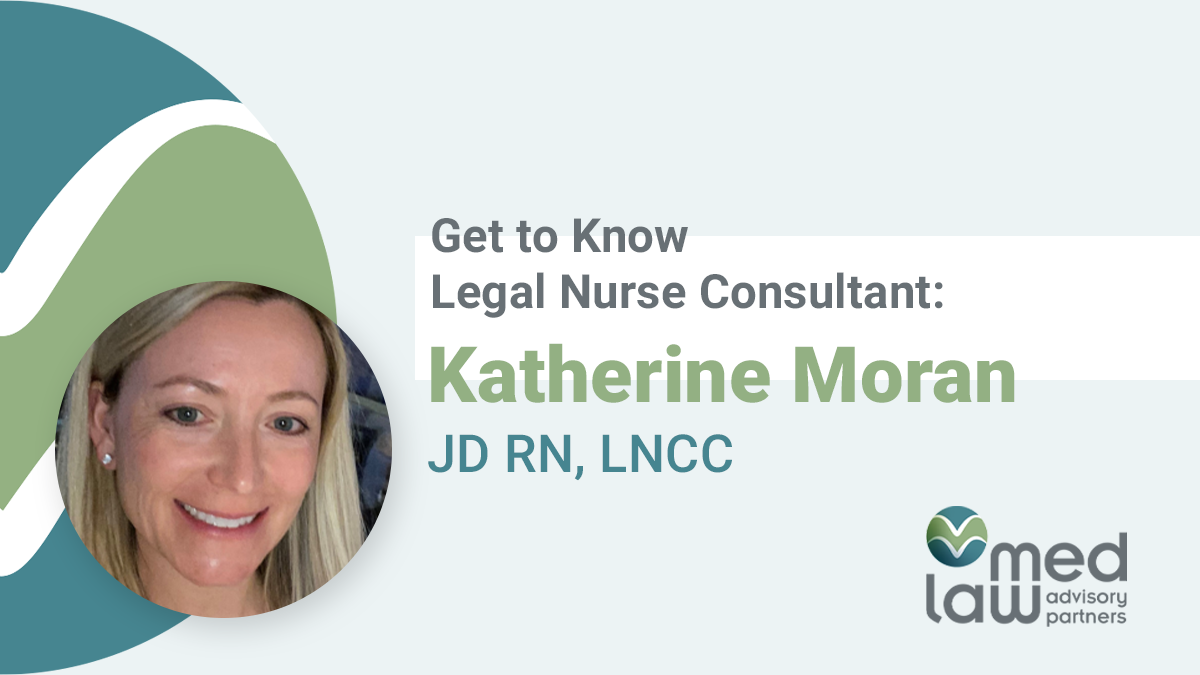
Name, title, city you are based in:
Katherine Moran, JD RN LNCC, Chicago IL
What is your role at Med Law Advisory Partners?
Legal Nurse Consultant
What did you do before working for Med Law Advisory Partners?
I am a consultant so I have worked with various firms in the past.
Why do you do this type of work? Do you have a specific area of expertise that you are the most fond of?
I am most fond of pediatric med mal. I used to be a peds inpatient nurse. I like to think that our work helps to identify gaps in care and promote safety changes in the healthcare setting.
In your opinion, what is the most rewarding aspect of your job?
Hopefully our work funnels its way through to risk management and affects positive outcomes at the bedside.
Tell us about a time you had to overcome a challenge or obstacle within being a legal nurse consultant – how did you overcome this/what did you learn?
When I was first starting out and had no experience, I found a nurse that was willing to give me a chance. I had no formal training at all and had just left bedside nursing. It was a challenging time learning the industry and getting comfortable communicating with clients. But it’s been very rewarding.
What is something in the healthcare industry that comes to mind that you would like to see improved or changed?
Better preventative care.
What are you most likely up to when you are off-the-clock?
Chasing my boys, cooking, needlepoint, exercising, and planning our next family vacation.
What is some advice you would give to nurses looking to pursue a career in legal nurse consulting?
Don’t give up! You will likely get a few No’s before someone will give you a chance.
Interesting fact about yourself:
My parents and 3 sisters are also lawyers.
Are you PREP-ared? The latest in PREP Act litigation
Tuesday, March 15th, 2022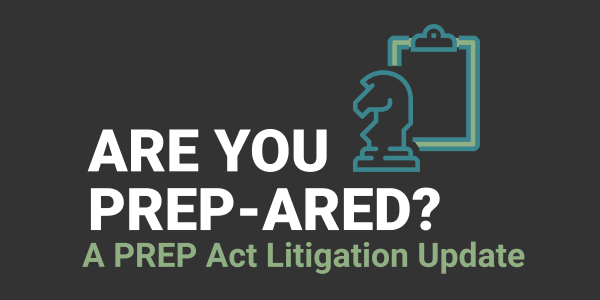
Liability stemming from the COVID-19 pandemic has impacts beyond the nursing home industry: hospitals are also keeping a close eye on pending litigation and lobbying for protections.
The American Hospital Association, for example, has said that as part of its 2022 advocacy agenda, it plans to support the application of immunity under the Public Readiness and Emergency Preparedness (PREP) Act. This would limit hospitals and other health care providers’ liability for measures taken in the delivery of care during the pandemic.
During a public health emergency, the PREP Act authorizes the HHS Secretary to limit legal liability for losses relating to the administration of medical countermeasures such as diagnostics, treatments and vaccines. In March 2020, then-HHS Secretary Alex Azar invoked the PREP Act after declaring COVID-19 a public health emergency.
In the two years following, the estates and loved ones of those who have died of COVID-19 in hospitals and under the care of nursing homes have filed wrongful death suits against the facilities in state courts, and health care organizations have responded by attempting to remove them to federal court, arguing that the PREP Act preempts state-law claims entirely.
At Med Law Advisory Partners, we have been following pending litigation that will shape the application of the PREP Act in future cases involving health care organizations. Late last year, we identified it as one of our top items to watch in 2022 and highlighted the first pandemic-era PREP Act ruling to emerge in the federal appeals courts: an October 2021 decision in Estate of Maglioli v. Alliance HC Holdings.
In Maglioli, the court declined to find that the PREP Act fully preempted the plaintiffs’ state-law negligence claims against a nursing home for the deaths of their loved ones. The court remanded the case to proceed in New Jersey state court.
Since our last discussion of the PREP Act, two more federal appeals courts have weighed in on the application of the law, again ruling in favor of the plaintiffs in nursing home wrongful death cases.
On Feb. 22, the U.S. Court of Appeals for the Ninth Circuit affirmed a lower court ruling remanding a case that was removed to federal court to state court in California. In Saldana v. Glenhaven Healthcare, the court found that it lacked federal subject matter jurisdiction to hear the plaintiffs’ claims.
Like in Maglioli, the court was unpersuaded by the defendants’ arguments that the plaintiffs’ claims were fully preempted by the PREP Act or that they were conscripted to assist a federal officer or agency in performance of a government duty that would allow for removal under the Federal Officer Removal statute.
On March 10, the U.S. Court of Appeals for the Fifth Circuit became the third federal appeals court to reject similar arguments in the case of Mitchell v. Advanced HCS, LLC.
Similar cases remain pending in several other federal appeals courts, including the U.S. Court of Appeals for the Seventh Circuit. The American Hospital Association joined with other groups in filing a friend-of-the-court brief in support of the defendants in that case.
In another sign that the PREP Act litigation is ramping up, in December, the National Law Journal reported that increasingly, Big Law firms are joining nursing homes and hospitals in their fight to establish their immunity.
While much of the litigation receiving news coverage to date has focused on nursing homes, the National Law Journal highlighted the case of Brookdale Hospital Medical Center, a New York hospital that, along with its physicians, is fighting claims brought by the family of a patient who suffered a severe case of COVID-19 and died at the hospital.
Court watchers and parties to these suits anticipate the U.S. Supreme Court will likely eventually step in to review the scope and application of the PREP Act. In the meantime, we will continue to monitor this evolving area of law and provide updates in the future.
Med Law Advisory Partners works directly with hospitals and health systems to complement their in-house leaders, broaden internal capacity for case analysis, determine the level of exposure based on merit, and facilitate a roadmap towards prompt resolution of claims.
We provide hospital executives and boards unique intelligence and guidance that supports the reliability of systems, improves patient outcomes, reduces financial risk, and strengthens the healthcare workforce.
Contact us today for more information on how we can partner with you.
Illinois Med Mal: A Defense State of the State
Tuesday, February 22nd, 2022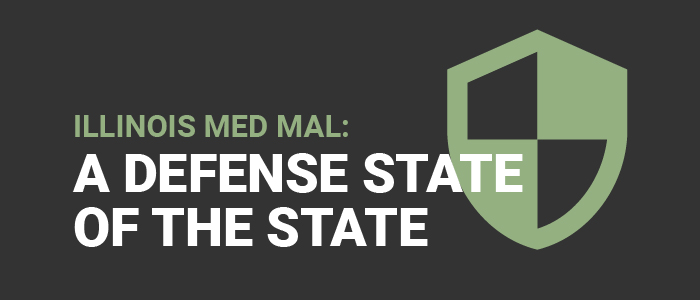
It’s no secret that Illinois is a plaintiff-friendly state. While true in several types of litigation, it is especially true for medical malpractice plaintiffs.
One indicator of the volume of malpractice litigation in the state can be found in Medscape’s 2021 Malpractice Report. The online health information giant surveyed 4,300 physicians nationwide between May and August 2021, asking if they’d been sued for malpractice in the prior year.
The report ranked Illinois fourth in the country for the prevalence of its doctors which reported being sued for malpractice. The top spot went to its next-door neighbor, Indiana, which was followed by New York and Pennsylvania.
Medscape noted that the prevalence of medical malpractice litigation in a state is tied to the extent of tort reforms, the number of doctors in the state, patient demographics, and legislatures’ efforts to cut down on frivolous litigation.
Illinois’ legislature and governor have been panned by groups that support tort reform, which would make it more difficult for injured parties to sue doctors and health systems, among other parties.
In December, the American Tort Reform Foundation, ranked Cook, Madison and St. Clair Counties in fifth place on its 2021-2022 Judicial Hellholes list, a jump from 8th place the prior year.
The group, which advocates for tort reform nationwide, places jurisdictions on the Judicial Hellholes list which it says are known for allowing innovative lawsuits, welcoming litigation tourism and expanding civil liability.
While the counties were largely listed for asbestos litigation and Illinois Biometric Information Privacy Act lawsuits, the group took swings at the Illinois General Assembly, which it deemed “one of the most plaintiff-friendly legislatures in the country” and Gov. J.B. Pritzker, whom the group asserted “supports a liability-expanding agenda to the detriment of Illinois citizens and small businesses.”
The group also marked the 20th anniversary of the Judicial Hellholes report by compiling an Everlasting Judicial Hellholes list of repeat offenders, including Illinois on the list.
In its rationale, it said that a jurisdiction from the state has been on each report since its inception and added that the Illinois plaintiffs’ bar is one of the most powerful in the country in terms of political influence, giving millions of dollars to lawmakers and office seekers.
One recent example of plaintiff-friendly legislation went into effect last summer after Gov. J.B. Pritzker signed into law a bill allowing plaintiffs to collect six percent prejudgment interest on judgments they receive for their personal injury and wrongful death lawsuits.
The law, Senate Bill 72, took effect July 1, 2021. Previously, Illinois law only allowed plaintiffs to receive nine percent interest post-judgment.
Proponents of the law, including the Illinois Trial Lawyers Association, said the law would incentivize earlier resolution of cases through settlement.
In a column for the Chicago Daily Law Bulletin, ILTA President J. Matthew Dudley explained that under the new law, defendants are provided a set off on prejudgment interest if they make a plaintiff a written settlement offer within the first 12 months that the case is pending. If the plaintiff rejects the offer, the set off will only accrue on the difference between the highest written offer and the case’s final judgment.
For the defense bar in Illinois, it will be key for health care clients to come to the negotiating table early. Early claims investigation is vital to that effort, including assessing the standard of care, causation and damages.
Our team at Med Law Advisory Partners has the necessary expertise to conduct thorough medical record reviews. Our consulting nurse experts draw on their skills and experience to research the standard of care and identify any deviations from it in the care a patient received.
If deviations exist, the legal nurse consultant determines whether they are relevant to the facts of the case and offers defense counsel an informed opinion on it.
Once the legal nurse consultant has weighed in on the standard of care, he or she, along with the team, investigates whether the elements of negligence have been met. Consulting nurse experts can be instrumental in proving or disproving whether any breach caused the injury claimed and the extent of any damages.
Specifically, he or she can determine the proximate cause, the result that directly produced an event that would not have otherwise occurred. In medical cases, the event is usually a physical injury or harm. The legal nurse consultant identifies the factors that directly contributed to the injury or harm from the record and other evidence.
Early claims assessment can dramatically impact the expenses in a medical negligence/malpractice case. With the new prejudgment interest law in place in Illinois, it only benefits defendants to get your ducks in a row early.
Contact us today to learn more about how we can help in your medical malpractice matter.
Illinois Medical Malpractice: A Plaintiff’s State of the State
Tuesday, February 22nd, 2022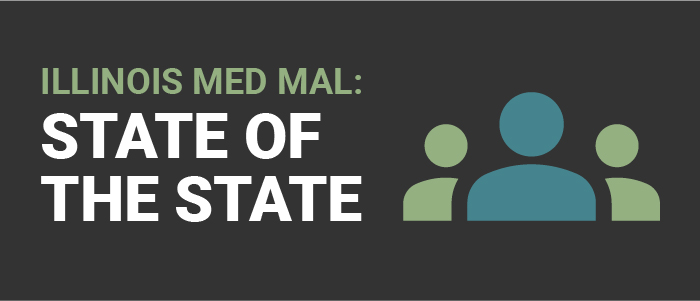
It’s no secret that Illinois is a plaintiff-friendly state. While true in several types of litigation, it is especially true for medical malpractice plaintiffs.
One indicator of the volume of malpractice litigation in the state can be found in Medscape’s 2021 Malpractice Report. The online health information giant surveyed 4,300 physicians nationwide between May and August 2021, asking if they’d been sued for malpractice in the prior year.
The report ranked Illinois fourth in the country for the prevalence of its doctors which reported being sued for malpractice. The top spot went to its next-door neighbor, Indiana, which was followed by New York and Pennsylvania.
Medscape noted that the prevalence of medical malpractice litigation in a state is tied to the extent of tort reforms, the number of doctors in the state, patient demographics, and legislatures’ efforts to cut down on frivolous litigation.
Illinois’ legislature and governor have been panned by groups that support tort reform, which would make it more difficult for injured parties to sue doctors and health systems, among other parties.
In December, the American Tort Reform Foundation, ranked Cook, Madison and St. Clair Counties in fifth place on its 2021-2022 Judicial Hellholes list, a jump from 8th place the prior year.
The group, which advocates for tort reform nationwide, places jurisdictions on the Judicial Hellholes list which it says are known for allowing innovative lawsuits, welcoming litigation tourism and expanding civil liability.
While the counties were largely listed for asbestos litigation and Illinois Biometric Information Privacy Act lawsuits, the group took swings at the Illinois General Assembly, which it deemed “one of the most plaintiff-friendly legislatures in the country” and Gov. J.B. Pritzker, whom the group asserted “supports a liability-expanding agenda to the detriment of Illinois citizens and small businesses.”
The group also marked the 20th anniversary of the Judicial Hellholes report by compiling an Everlasting Judicial Hellholes list of repeat offenders, including Illinois on the list.
In its rationale, it said that a jurisdiction from the state has been on each report since its inception and added that the Illinois plaintiffs’ bar is one of the most powerful in the country in terms of political influence, giving millions of dollars to lawmakers and office seekers.
One recent example of plaintiff-friendly legislation went into effect last summer after Gov. Pritzker signed into law a bill allowing plaintiffs to collect six percent prejudgment interest on judgments they receive for their personal injury and wrongful death lawsuits.
The law, Senate Bill 72, took effect July 1, 2021. Previously, Illinois law only allowed plaintiffs to receive nine percent interest post-judgment, meaning the interest accrued following the date their judgment was entered.
Proponents of the law, including the Illinois Trial Lawyers Association, said the law would incentivize earlier resolution of cases.
In a column for the Chicago Daily Law Bulletin, ILTA President J. Matthew Dudley explained that under the new law, defendants are provided a set off on prejudgment interest if they make a plaintiff a written settlement offer within the first 12 months that the case is pending. If the plaintiff rejects the offer, the set off will only accrue on the difference between the highest written offer and the case’s final judgment.
Med Law Advisory Partners works with Illinois plaintiffs on their medical malpractice matters. One way we can assist plaintiffs is through helping them verify that their claims have merit.
Under Illinois law, plaintiffs are required to submit an affidavit with their complaint declaring that the affiant (typically, their attorney) has consulted with a healthcare professional whom they reasonably believe:
- Is knowledgeable about the relevant issues involved in the particular action;
- Who currently or in the last six years has practiced or taught in the same area of health care or medicine that is at issue in the particular action; and
- is qualified by experience or demonstrated competence in the subject of the case.
There are several advantages to engaging Med Law Advisory Partners early in your litigation.
First, because our consulting nurse experts offer their knowledge and talents at a cost-effective rate substantially lower than a testifying expert rate, engaging Med Law can help minimize unnecessary expenses at the beginning of the case, which is particularly important when a case is found to have little or no merit.
Our consulting nurse experts have decades of clinical experience in a wide variety of specialties and established practice in managing the nuances of medical-legal claims.
They’re able to partner with the legal team early to quickly assess the strengths and weaknesses of a claim and inform litigation strategy — a skill not found in many testifying experts. Consulting nurse experts use data-driven processes, standard of care evaluation, and clinical judgment to identify the issues that truly matter and help the legal team determine the best path to claim resolution.
If, and when needed, our team also can help plaintiffs work with a testifying expert who supports the established theories of liability.
Additionally, we can help plaintiffs’ counsel pinpoint important issues in a case quickly, including assessing the extent of the plaintiff’s injuries, their level of recovery, and their overall damages. The result is a savings in time and expense for the client.
Contact us for more information on how we help Illinois plaintiffs in their medical malpractice matters.
Get to Know Legal Nurse Consultant: Maggie Williamson
Tuesday, February 8th, 2022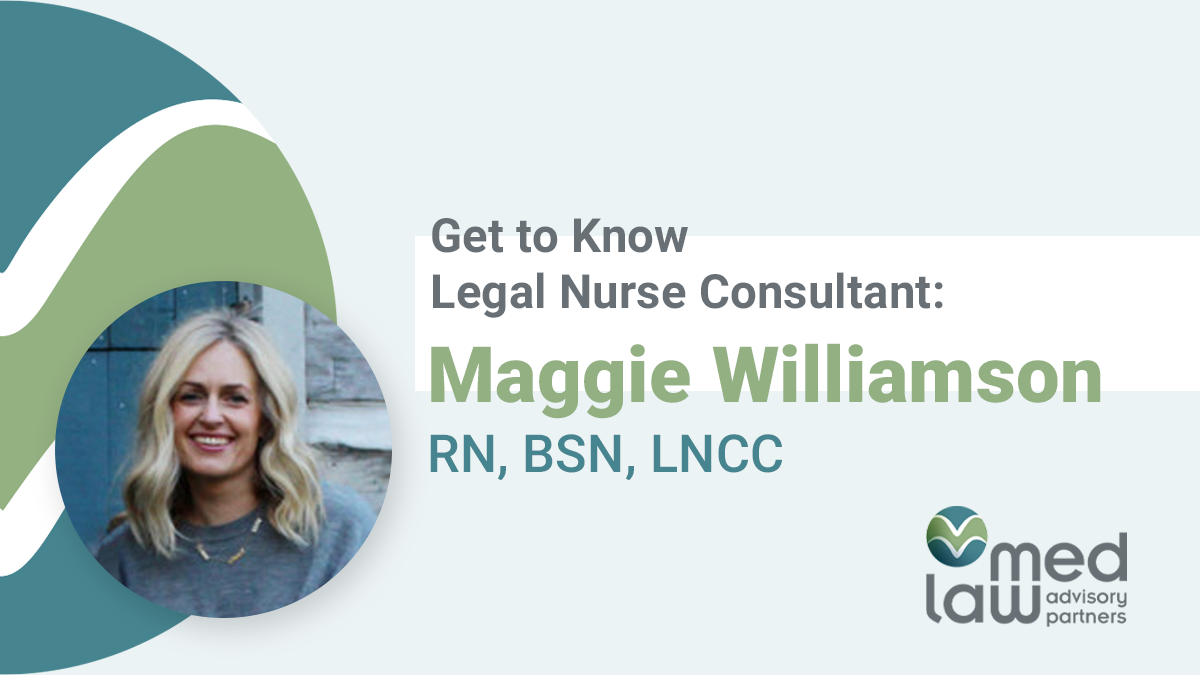
Name, title, city you are based in:
Maggie Williamson, RN, BSN, LNCC based in Winnetka, IL.
What is your role at Med Law Advisory Partners?
Legal Nurse Consultant
What did you do before working for Med Law Advisory Partners?
I worked in bedside nursing prior to beginning my career at Med Law Advisory Partners. I have worked in a multitude of healthcare settings with the primary setting being Labor & Delivery.
Why do you do this type of work? Do you have a specific area of expertise that you are the most fond of?
After my years in nursing, I pivoted to Legal Nurse Consulting to use my nursing skills in a different setting. It was refreshing to see my nursing experience serve a new purpose. Given the majority of my nursing experience was in Women’s Health/Labor & Delivery I enjoy participating in birth injury cases.
In your opinion, what is the most rewarding aspect of your job?
Being able to help clients understand the nursing process and how it affects the potential medical malpractice for both defense and plaintiff cases.
Tell us about a time you had to overcome a challenge or obstacle within being a legal nurse consultant – how did you overcome this/what did you learn?
The field of Legal Nurse Consulting always leaves the potential for disagreement on liability. It is essential to continue learning how to understand different viewpoints on the liability of different facilities and providers. Every healthcare provider brings different opinions and experiences to the table when looking at the potential viability of a case.
What is something in the healthcare industry that comes to mind that you would like to see improved or changed?
I hope that the role of the bedside nurse becomes more respected and compensated. The bedside nurse is an integral part of the entire healthcare process, and I hope society begins to appreciate their contribution to the healthcare community.
What are you most likely up to when you are off-the-clock?
Being with my husband and 3 kids who are 9, 7, and 5 years old!
What is some advice you would give to nurses looking to pursue a career in legal nurse consulting?
I would tell them to try to connect with fellow nurses who are already in the business to get an idea of the process and what skills you need to hone to become successful.
Interesting fact about yourself:
Before my nursing career I worked in PR in Los Angeles.
What West Virginia’s New Healthcare Fraud Initiative Means for You
Tuesday, February 1st, 2022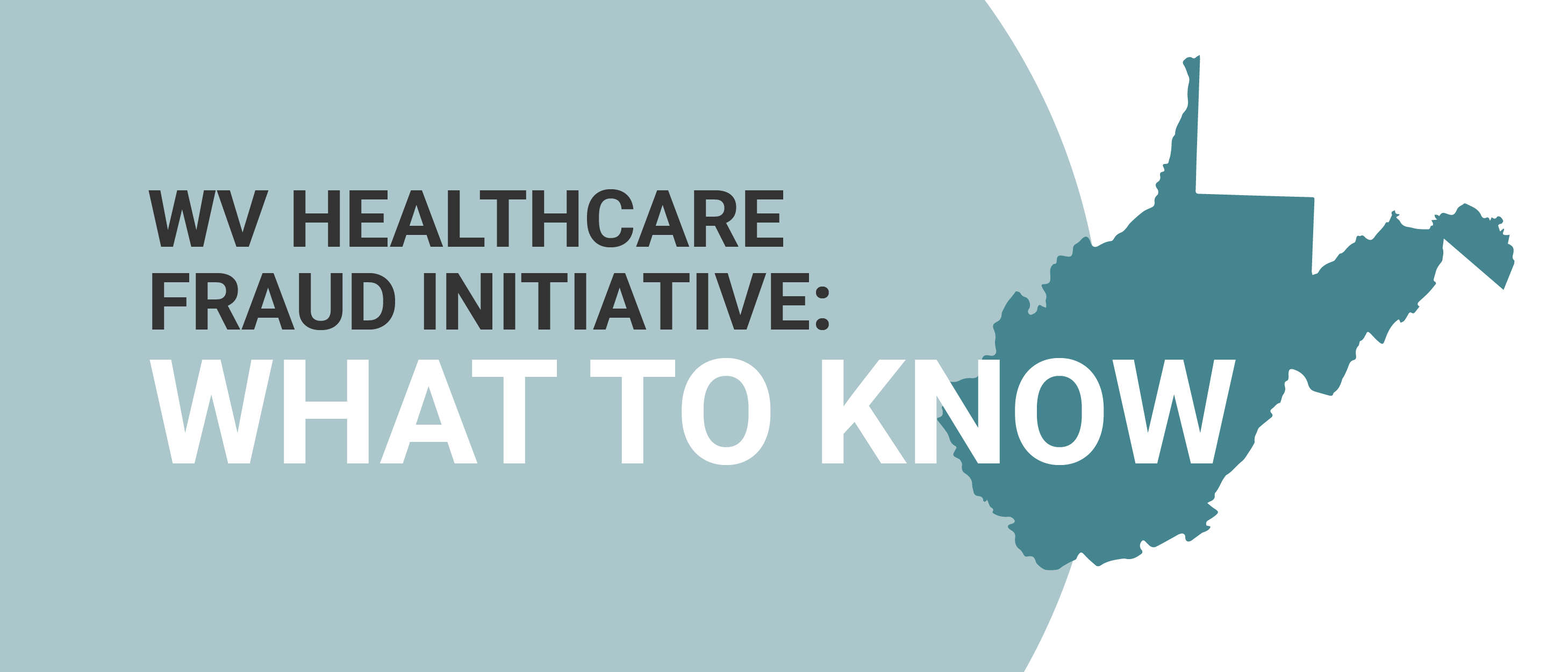
West Virginia healthcare providers are feeling the heat of a new initiative aimed at cracking down on healthcare fraud in the state.
On Jan. 18, U.S. Attorney for the Northern District of West Virginia William Ihlenfeld announced the launch of the Mountaineer Health Care Fraud Strike Force. He said the unit, composed of state and federal law enforcement agencies, will rely on data to combat waste and abuse in the health care industry.
“The time I spent in the private sector opened my eyes to the scope of the health care fraud that is occurring in West Virginia,” Ihlenfeld said. “It made me realize that more can and should be done by law enforcement, which is why this new group has been formed.”
The group first met the day of the announcement, Ihlenfeld said. The seven agencies present discussed fraudulent billing patterns and identified new targets for investigation. In addition to enforcement, the group will work with providers and insurers so that there’s a better understanding on how to recognize and report health care fraud, he said.
Health care fraud in West Virginia is intimately linked with the state’s opioid crisis. The state has one of the highest rates of non-medical use of prescription pain relievers in young people in the country and opioids are the number one cause of overdose deaths in the state, according to West Virginia’s attorney general’s office.
Health care fraud cases in West Virginia tend to be complex. In addition to opioid and controlled substance over prescription, cases tend to involve additional layers of illegal kickback and referral schemes involving doctors, pharmacies and laboratories.
In one high-profile recent case, Wheeling Hospital, Inc., in Wheeling, West Virginia, agreed in 2020 to pay $50 million to settle alleged False Claims Act violations. The federal government alleged the hospital knowingly submitted claims to Medicare that resulted from violations of the Physician Self-Referral Law and the Anti-Kickback Statute.
The government alleged the hospital, under prior management, violated federal law by knowingly and willfully paying improper compensation to referring physicians based on the volume or value of the referrals or was above fair market value.
At Med Law Advisory Partners, we work with healthcare providers to both preempt such investigations and provide critical support to healthcare entities facing active investigations.
For decades, Med Law’s consulting nurse experts have supplemented in-house legal and compliance teams in reviewing medical records for appropriateness of care and medical necessity, resulting in measurable, positive outcomes in investigative matters.
In the area of controlled substances, the Med Law team works with our clients to ensure they implement safe prescribing practices and help minimize the fallout in the event of a compliance investigation. Our consulting nurse experts have experience in providing audit support in investigations related to allegations such as reckless prescribing of narcotics and wrongful death related to overdose from prescribed controlled substances.
We also respond to active investigations, providing critical medical record reviews that can help clients facing costly penalties.
Taking a proactive posture will be crucial for health care organizations when it comes to the current environment in West Virginia. By evaluating policies and procedures, as well as ensuring effective training and compliance programs are in place, health care organizations can reduce their exposure to such claims.
We are here to help your health care provider clients prevent and mitigate the fallout from investigations surrounding controlled substances as well as the full spectrum of healthcare fraud. Contact us today for more information.
Get to Know Our Peer Review Specialist: Lisa Dalesandro
Thursday, January 13th, 2022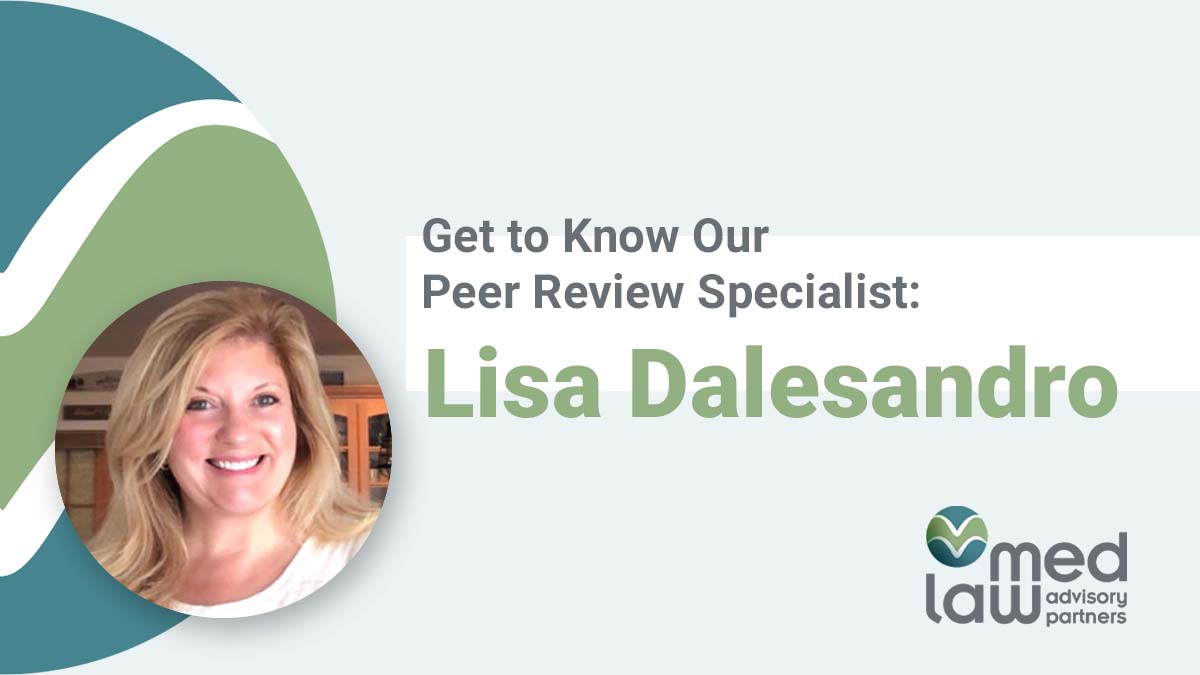
Name, title, city you are based in:
Lisa Dalesandro, RN, BSN, CCRN, CEN, LNCC
Northern New Jersey/NYC metropolitan area
What is your role at Med Law Advisory Partners?
Peer Review Specialist
What did you do before working for Med Law Advisory Partners?
I have worked in diverse areas of nursing over the last 27 years, including pediatric home care and med/surg nursing, but am currently a critical care nurse in the MICU at a teaching hospital in Newark, NJ, in addition to working as a consultant with MLAP.
Why do you do this type of work? Do you have a specific area of expertise that you are the most fond of?
I enjoy evidence-based research and writing, which are both very important in legal nurse consulting. I am also very fond of mentorship and teaching new nurses.
In your opinion, what is the most rewarding aspect of your job?
The most rewarding aspect of my job is collaborating with a top-notch group of nurses dedicated to producing a superior finished product, whether it is a medical records timeline, a case report, or just helping a non-medical person to understand a complicated concept. Working together supportively is what makes this job special.
Tell us about a time you had to overcome a challenge or obstacle within being a legal nurse consultant – how did you overcome this/what did you learn?
I have been collaborating with lawyers, both as a paralegal and legal nurse consultant, for as long as I have been a nurse. Having worked in a law firm during high school and college, nursing and law have been intricately woven into my professional life. My biggest challenge as a legal nurse consultant has been establishing myself as more than assistive personnel and a vital piece of a winning legal team to those who may not have been familiar with legal nurse consulting as a profession.
What is something in the healthcare industry that comes to mind that you would like to see improved or changed?
A deeper respect for nurses in the healthcare industry, translated into normalization of safe and appropriate staffing, competitive pay rates, and supportive professional standards which also encompass a general advancement of equitable workplace and improved healthcare standards for everyone, would be a welcome change.
What are you most likely up to when you are off-the-clock?
During downtime, you will most likely find me with my family, friends and three dogs, enjoying all of the great activities in the greater New York City area. In the summer, you will find me down the shore, appreciating all of New Jersey’s beautiful beaches.
What is some advice you would give to nurses looking to pursue a career in legal nurse consulting?
Spend time reading and writing. Your nursing skills are important, but the ability to communicate effectively is what will set you apart.
Interesting fact about yourself:
I can balance a spoon on my nose and ears for a really long time.
Set Your Medical Malpractice Defense Up For Success Through Early Evaluation
Tuesday, January 11th, 2022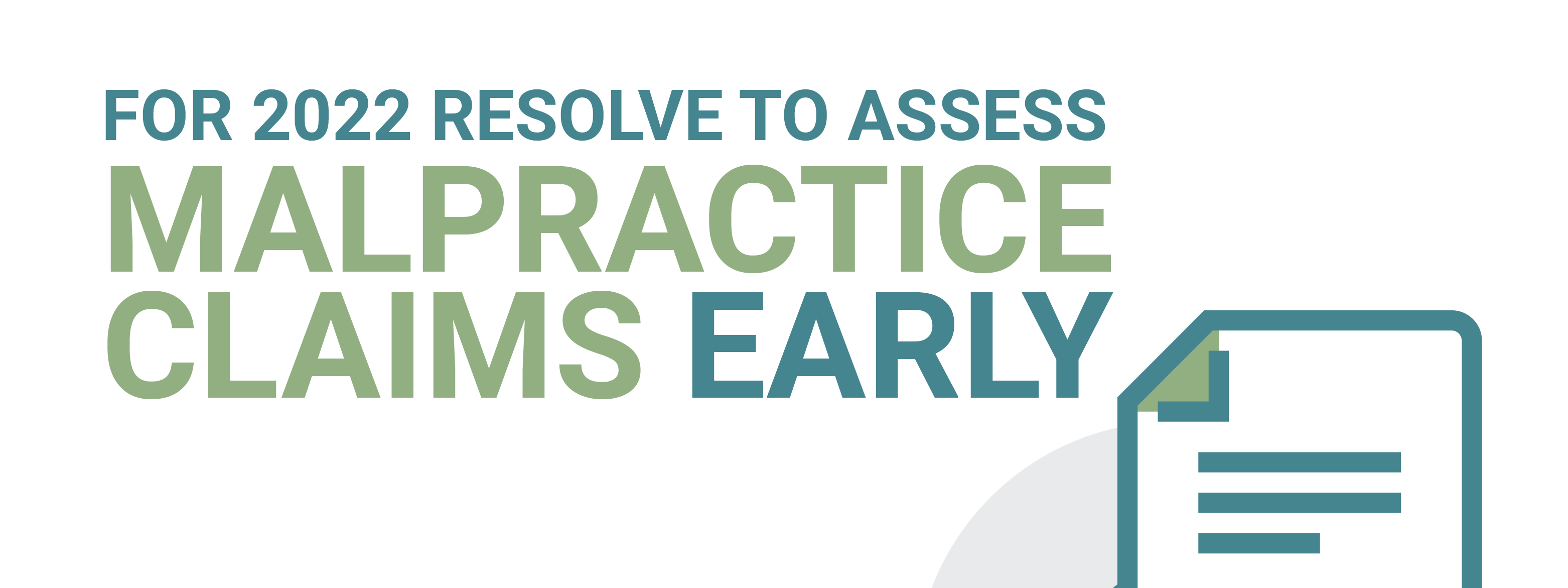
Ringing in the new year brings opportunities to reflect upon the past year and make resolutions to better ourselves in the new one.
In 2022, healthcare systems facing medical malpractice claims should consider adding a new resolution to their list: committing to investing in early-stage claim assessments so that they may be resolved quickly and in a cost-effective manner.
For each medical malpractice claim they face, it is crucial early on in a case to assess the standard of care, causation, and damages.
It’s not uncommon for defendants and their counsel to experience regret at the conclusion of the case for not more thoroughly evaluating these three measures at the outset. Each is important for equipping counsel with the information needed to make decisions about the case.
For example, no defendant wants to settle claims for more than they’re worth, to try a case that should never have reached a courtroom or settle when a case should be tried. For each of these scenarios, early investigation is key.
At Med Law Advisory Partners, our team has the expertise needed to conduct thorough medical record reviews. Our consulting nurse experts use their skills to research the standard of care and identify any deviations from it in the delivery of patient care.
If deviations exist, the legal nurse consultant determines whether those deviations are relevant to the facts of the case and offers counsel an informed opinion on it.
Once the legal nurse consultant has weighed in on the standard of care, he or she, along with the team, investigates whether the elements of negligence have been met. Consulting nurse experts can be instrumental in proving or disproving whether any breach caused the injury claimed and the extent of any damages.
Specifically, he or she can determine the proximate cause, the result that directly produced an event that would not have otherwise occurred. In medical cases, the event is usually a physical injury or harm. The legal nurse consultant identifies the factors that directly contributed to the injury or harm from the record and other evidence.
Early valuation of a claim can dramatically impact the expenses in a medical negligence/malpractice case. Legal nurse consultants play a key role in assessing the extent of any damages and helping value the claim, which in turn can help determine whether the parties want to settle early or proceed to trial. Early settlement often saves money for all parties involved.
In addition to claims assessments, our team may also be engaged to develop strategy on possible outcomes of a claim and provide executive consulting to the healthcare team to help minimize risk for future similar claims.
Contact us today to learn more about how early engagement can work to your benefit in your medical malpractice matter.
What your healthcare organization can expect in 2022
Monday, December 13th, 2021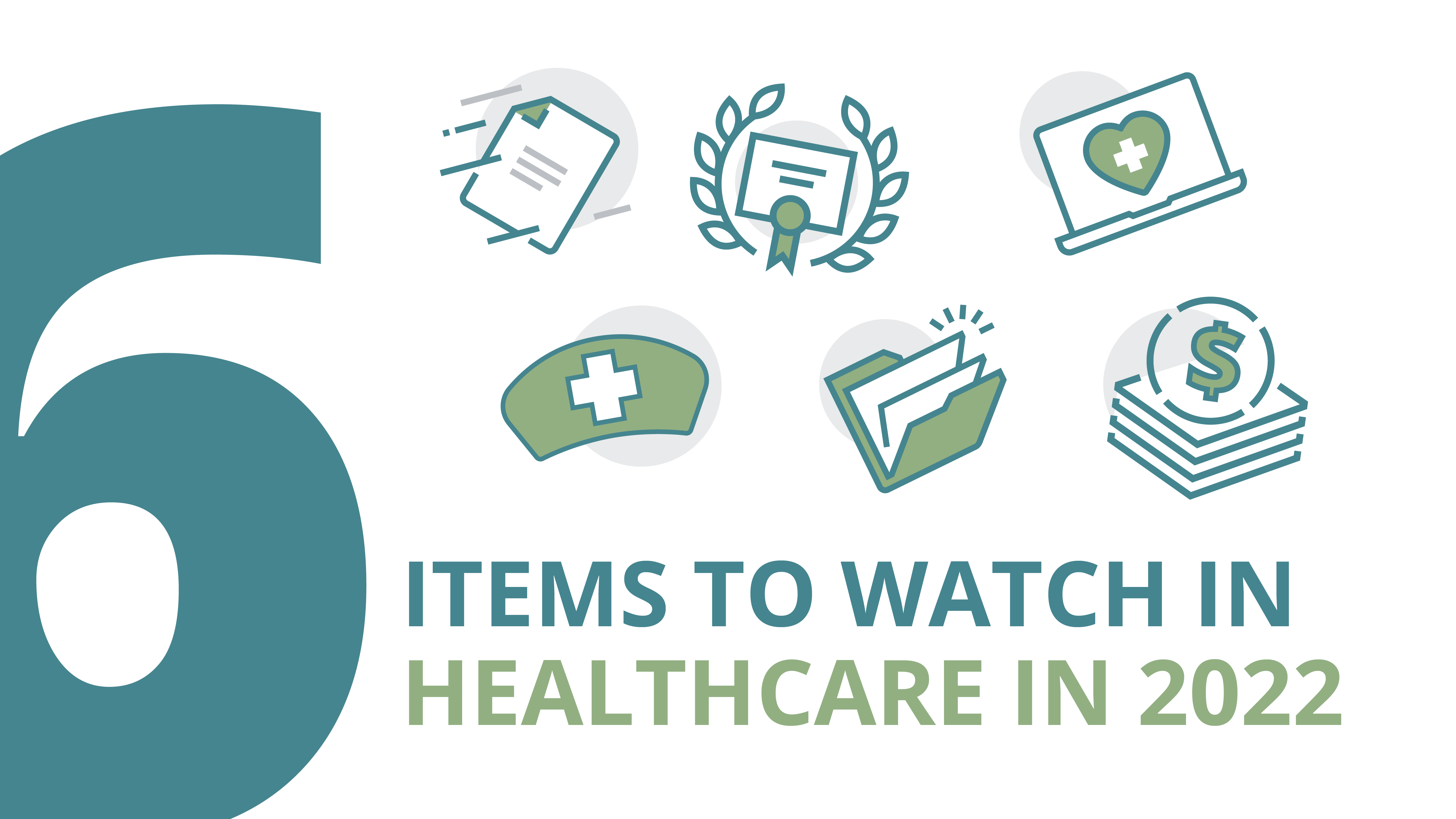
As we prepare to close out 2021, 2022 already looks to be an eventful year for the healthcare industry.
To help get a head start on the new year, Med Law Advisory Partners has identified six issues we expect to loom large on our clients’ radar. We’ve assembled this list from key developments in healthcare law in 2021 and from upcoming reports expected in 2022 from the Department of Health and Human Services’ Office of Inspector General.
Here are six things your organization can expect from the healthcare industry and in healthcare law in 2022.

1. An increase in medical malpractice litigation
The healthcare industry is bracing itself for an increase in medical malpractice lawsuits, a trend which can be seen in the further hardening medical malpractice insurance market.
According to Risk & Insurance, the industry is not only anticipating an increase in claims associated with the spread, diagnosis and treatment of COVID-19, it’s also anticipating a rise in claims tied to the availability of health care and health care resources during the pandemic. Medical professional liability carriers are particularly concerned about a wave of new litigation as statutes of limitation approach in the next two years.
A wave of new claims will continue to require hospitals and aging-services providers to do more with already-limited risk management, legal and quality-assurance budgets. Such organizations should consider how Med Law can partner with them to expand their capacity to respond, whether in terms of investigating claims or reviewing records for active litigation.
 2. Uncertainty surrounding liability for claims under the PREP Act
2. Uncertainty surrounding liability for claims under the PREP Act
In addition to anticipating more litigation, healthcare organizations, especially long-term care providers, are keeping a close eye on how federal courts interpret healthcare provider immunity as set out by the federal Public Readiness and Emergency Preparedness Act, or PREP Act.
In March 2020, then-HHS Secretary Alex Azar invoked the PREP Act after declaring COVID-19 a public health emergency. The PREP Act authorizes the HHS secretary to limit legal liability for losses relating to the administration of medical countermeasures such as diagnostics, treatments and vaccines.
Across the country, the estates of people who have died of COVID-19 while under the care of nursing homes have filed wrongful death suits against the facilities in state courts, and nursing homes have responded by removing them to federal court. Nursing homes have argued in court that the PREP Act preempts state-law claims entirely.
While several lower-level federal courts have ruled on the issue – mostly in favor of plaintiffs – as of early December, only one federal appeals court has weighed in. In October, in Estate of Maglioli v. Alliance HC Holdings, the U.S. Court of Appeals for the Third Circuit declined to find that the PREP Act fully preempted the plaintiffs’ state-law negligence claims. The court found that while federal courts have jurisdiction over claims of “willful misconduct” as outlined in the PREP Act, the plaintiffs’ claims were not similar enough to allow the case to proceed in federal court. The case will continue instead in New Jersey state court.
Similar cases are proceeding in other federal appellate circuits and are sure to make new law in 2022. Med Law is keeping a close eye on developments in this arena; follow us on LinkedIn for updates on this issue.
 3. Increased HHS scrutiny of telehealth services
3. Increased HHS scrutiny of telehealth services
Early in the COVID-19 pandemic in 2020, the Centers for Medicare & Medicaid Services, or CMS, issued temporary policy changes making it easier for Medicare and Medicaid patients to receive care through telehealth services when in-person care was limited. This year, HHS’s Office of Inspector General announced investigations as part of its Work Plan that touch on telehealth services, with reports expected in 2022.
One is a telehealth-related audit of Medicare Part B Services. The audit includes two phases. The first phase focuses on whether services such as evaluation and management, opioid-use disorder, end-stage renal disease and psychotherapy meet Medicare requirements, while the second phase focuses on a broader range of Medicare Part B telehealth services.
HHS also announced that it planned to audit home health services provided as telehealth during the COVID-19 public health emergency. The office is evaluating home health services provided by agencies to determine which types of skilled services were furnished via telehealth and whether those services were administered and billed according to Medicare requirements. OIG said it would report any improperly billed services as overpayments and make recommendations to CMS based on the results of the audit.
 4. The results of an HHS study of how the pandemic affected nursing homes
4. The results of an HHS study of how the pandemic affected nursing homes
Few healthcare settings have experienced the depth of loss during the pandemic as have American nursing homes and long-term care facilities. Because residents of these facilities are most likely to be elderly, have pre-existing health conditions and live in communal settings, they’ve been especially vulnerable to the pandemic.
With those conditions in mind, in April 2021, HHS announced a three-part study of how the pandemic affected nursing homes. In the first phase of the study, which has been completed, HHS analyzed the extent to which Medicare beneficiaries in nursing homes were diagnosed with COVID-19 and described the characteristics of patients at greater risk.
In the second phase, the study’s goal is to describe the characteristics of nursing homes hit hardest by the pandemic, and, in the third phase, the office intends to describe strategies nursing homes used to mitigate challenges. HHS is expected to issue the remaining portions of the audit report in 2022.
 5. The release of opioid-use disorder treatment service data
5. The release of opioid-use disorder treatment service data
In the background of the COVID-19 pandemic, another public health threat has loomed large: the opioid epidemic. According to CDC data released in November, an estimated more than 100,000 Americans died of drug overdose deaths in the year ending in April 2021.
As a result, HHS has focused some of its investigative efforts on both the prescription of opioids and treatment of opioid-use disorder. In addition to updating its early-2020 opioid data in 2021, in August, HHS announced plans to audit Medicare Part B opioid-use disorder treatment services provided by opioid treatment programs to determine whether the services were allowable in accordance with Medicare requirements.
 6. The results of Medicare payment audits
6. The results of Medicare payment audits
Going into 2022, healthcare organizations can expect a continued interest from the HHS OIG in rooting out Medicare fraud.
In 2021, HHS said it will audit whether Medicare appropriately paid claims under Medicare Part B for physician services based on correct place-of-service code when a beneficiary was an in-patient at a skilled nursing facility or hospital. This audit was prompted by preliminary 2018 and 2019 data that showed that Medicare may have paid a significant number of claims at a higher nonfacility rate when the beneficiary was a Part A inpatient at a hospital or skilled nursing facility.
It also announced plans to audit Medicare emergency department evaluation and management services to ensure Medicare payments to providers for such services were appropriate, medically necessary, and paid in accordance with Medicare requirements.
Both reports are anticipated for release in 2022.
In November, HHS also announced plans to review Medicare payments for inpatient claims involving mechanical ventilation and Medicaid inpatient claims involving severe malnutrition. The reports are scheduled for release in 2023.
How we can help
Whether your healthcare organization is facing a medical malpractice claim or investigation, the team at Med Law is here to assist by helping expand your internal capacity to handle claims. Med Law has a breadth of knowledge stemming from the vast and varied clinical experience of our team. As medical consultants, our highly-skilled clinicians work with both health care systems and legal teams to ensure positive outcomes in medical-legal matters. Contact us for more on how our team can assist yours.